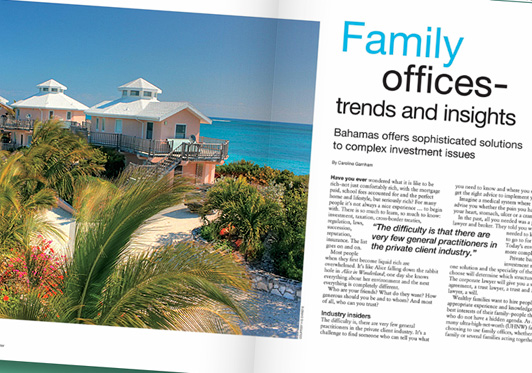| Published: Date: Updated: Author: |
The Bahamas Investor Magazine July 29, 2016 July 29, 2016 Caroline Garnham (pictured) |
Have you ever wondered what it is like to be rich–not just comfortably rich, with the mortgage paid, school fees accounted for and the perfect home and lifestyle, but seriously rich? For many people it’s not always a nice experience … to begin with. There is so much to learn, so much to know: investment, taxation, cross-border treaties, regulation, laws, succession, reputation, insurance. The list goes on and on.
Most people when they first become liquid rich are overwhelmed. It’s like Alice falling down the rabbit hole in Alice in Wonderland; one day she knows everything about her environment and the next everything is completely different.
Who are your friends? What do they want? How generous should you be and to whom? And most of all, who can you trust?
Industry insiders
The difficulty is, there are very few general practitioners in the private client industry. It’s a challenge to find someone who can tell you what you need to know and where you should go to get the right advice to implement your solution.
Imagine a medical system where no one could advise you whether the pain you have is due to your heart, stomach, ulcer or a cramp.
In the past, all you needed was a private banker, lawyer and broker. They told you what you needed to know and who to go to for the solution. Today’s environment is more complex. Private banks and investment managers are one solution and the speciality of the lawyer you choose will determine which structure is used. The corporate lawyer will give you a shareholders’ agreement, a trust lawyer, a trust and a succession lawyer, a will.
Wealthy families want to hire people with the appropriate exper ence and knowledge to act in the best interests of their family–people they can trust who do not have a hidden agenda. As a result, many ultra-high-net-worth (UHNW) families are choosing to use family offices, whether for a single family or several families acting together.
Most family offices are unable to provide all investment advice in- house, and many need to use third party providers to manage the family office. Family office employees (appointed by the family) invariably come out of the profession and are well placed to know how and where the family is likely to be overcharged or poorly serviced for their banking or investment requirements.
Independent, neutral advice
Because most family offices look after the investment requirements of the UHNW family, there is a new trend developing to provide independent, neutral advice to help navigate the myriad rules and regulations that plague the UHNW family–taxation, cross-border succession, dispute resolution, immigration, property acquisition, tenant-landlord dispute resolution or whatever else.
Family offices not only provide UHNW families with a solution, but also introductions to the right professional at the right price.
But it’s not always just simply finding the right adviser. Very often the difficulty is understanding the true nature of the problem.
If a family wants to preserve wealth from one generation to the next, there are many advisers who would recommend a trust. The easy bit is the drafting; the tricky part is identifying the trustee who will manage the trust following the founder’s death.
Even harder is deciding who will monitor and manage the trustee to ensure the trust functions as the founder and family intended and meets its goals and missions. Many excellent structures fall apart due to a lack of supervision and trustee accountability. Things often start off well but can get bogged down with a family dispute or become reactive and then entropy sets in.
Better in The Bahamas
I was acting for a client of extraordinary wealth. It was important that he could trust those in control of his wealth structure. He wanted to preserve wealth from one generation to another, but he also wanted specific people to make the decisions of his trust.
The problem we came across was that the people he wanted to make decisions were living in countries that could levy an unwanted tax on the trust, if they held the office as trustee personally.
It was therefore necessary for the client to set up a private company to act as the trustee. He was attracted to The Bahamas because of regulatory legislation in the Private Trust Company Act (PTC).
The legislation provides a license to operate, but only if the company complies with the rules of the Act, otherwise the license could be withdrawn. This gave my client enormous comfort.
He also recognized that the people he wanted to make the decisions of the private trustee company would not want to carry out the administration of the company.
The Bahamas was perfect since there were plenty of trustee administration companies that could provide this service in a contractual arrangement that could be reviewed on an annual basis.
At any time a trust administration service did not meet the standard, it could simply be replaced under the terms of its contract. Again, this gave the client great comfort.
Corporate governance
He then asked me a question that I could not answer satisfactorily–who should own the shares of his private trustee company?
As a family governance lawyer for over 15 years, I started to think about how to apply good principles in corporate governance to a structure for wealth preservation.
The essence of good corporate governance is to avoid a build-up of power in the hands of any one person; make sure all parties are accountable and can be removed if his or her actions are contrary to the overall mission of the business and to monitor and report on progress.
My client, having run numerous successful businesses, knew this. If one of his businesses was not performing as well as it should, he had a tendency to say: “Give me someone to fire.”
It was important to him that whoever owned his private trustee company should not only have the power to oversee the decisions taken by the company and resolve any disputes, but also to remove any troublemaker and replace him or her with someone more suitable.
Of course there are a number of solutions: a purpose trust, a charity, or a foundation, but they all had their disadvantages or drawbacks.
Bahamas executive entity
The result of this case was The Bahamas executive entity (EE), which was approved by the Bahamian Parliament and passed into law in December 2011. The EE is a stand alone legal entity designed to hold the shares of the PTC. Its board acts as a non-executive board with the specific task to ensure that the PTC is acting in accordance with the mission of the family and that everyone is doing their job at the right price and producing the right results. If not, board members can be removed and replaced.
There is now less need for a long and cumbersome letter of wishes. What is more appropriate is a mission statement outlining what the family endeavours to do with its wealth for future generations, similar to the memorandum of association of a company.
The EE is not limited to holding shares in a PTC. Some trusts reserve powers to a protector or board of protectors. The duties of this office are fiduciary, which means that if the family suffers a loss as a result of a decision, then the protector could be made liable for that loss as a breach of its fiduciary duty.
This, for some protectors, is too onerous and even with professional indemnity insurance is not worth the fee or the risk. However, if an EE is formed, the protectors can be appointed to the board and as such have limited liability. This is very attractive to people willing and able to take up this office, but who would otherwise refuse to stand.
UHNW individuals who are keen to preserve their wealth for future generations and sleep well at night, need to know what they want and to find the right advisers to guide them, the right structure flexible enough to change with time and circumstances, and the right jurisdiction, which for many is The Bahamas.










